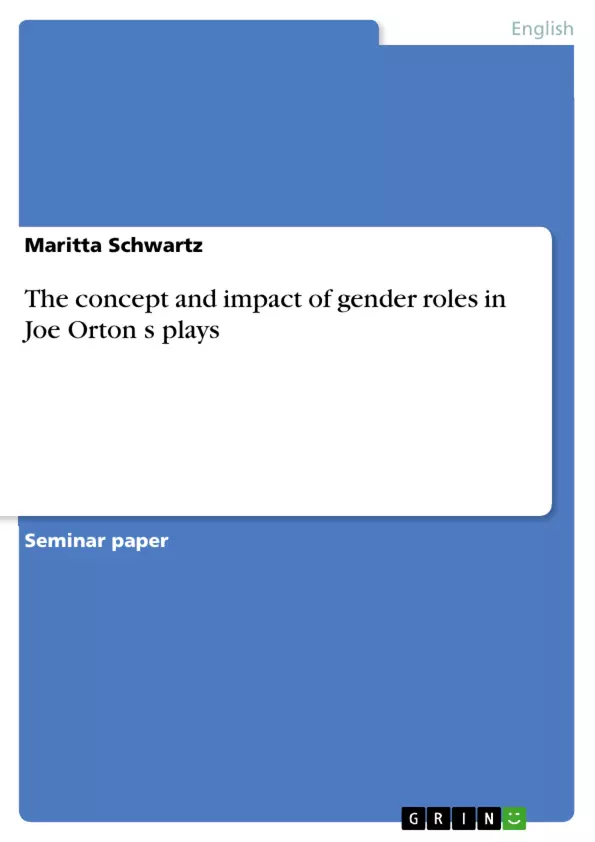1. Introduction
There are certain characteristics in Joe Orton’s plays that are very typical and of distinctive significance. The aspect of gender roles is one of those characteristics. The purpose of this paper is to explain, why the aspect of gender roles is so important, which different concepts of gender roles we can distinguish in Orton’s plays and, eventually, to show and explain those different concepts explicitly at three selected plays.
2. What are gender roles?
Before we are going to discuss the impact of gender roles in Orton’s plays, we should give a short definition of what is meant by this term.
Sex and gender are two terms that have to be clearly distinguished from each other. Whereas the term sex means the natural sex of a person, animal or thing, the term gender is aimed at the grammatical and sociological system of sex-references. In the German language, e.g., the grammatical gender of a girl is neuter (das Mädchen) although her natural sex is, of course, feminine. In our context the term gender refers to the different concepts of roles that exist in society, i.e. different sets of norms for behaviour that are associated with being either feminine or masculine and thus create sexual identity. A traditional concept of the feminine role would, for instance, be the one of the housewife and mother, staying at home, cooking and looking after the children. Accordingly, the traditional concept of the masculine role would be the one of the hard-working head of the family. Of course, there are lots of other concepts, some of which we will find in Orton’s plays.
Inhaltsverzeichnis (Table of Contents)
- Introduction
- What are gender roles?
- The concepts of sexuality and gender in Orton's plays
- The Conception of the Characters
- Sex and Crime in "Loot"
- Fay
- McLeavy
- Hal and Dennis
- Truscott
- The Mummy
- Summary
- The Triangular Relationship in "Entertaining Mr. Sloane"
- Kath
- Ed
- Sloane
- Kemp
- Kath, Ed and Sloane - the triangular relationship
- Role Switching and Sexual Identity in "What the Butler Saw"
- Dr. Prentice
- Mrs. Prentice
- Dr. Rance
- Nick
- Geraldine Barclay
- Sergeant Match
- Conclusion
Zielsetzung und Themenschwerpunkte (Objectives and Key Themes)
This paper examines the significance of gender roles in Joe Orton's plays. It defines gender roles and explores the different concepts of gender roles present in Orton's work. The paper then analyzes three selected plays, illustrating the various concepts of gender roles through specific examples.
- The impact of gender roles in Joe Orton's plays
- The distinction between sex and gender
- The Apollonian and Dionysian concepts of sexuality in Orton's work
- The subversive nature of sexuality in Orton's plays as a challenge to societal norms
- Orton's own homosexuality and its influence on his work
Zusammenfassung der Kapitel (Chapter Summaries)
The introduction sets the stage for the paper, highlighting the importance of gender roles in Orton's plays. Chapter 2 provides a definition of gender roles, distinguishing between sex and gender. Chapter 3 delves into the concepts of sexuality in Orton's plays, contrasting the Apollonian and Dionysian spirits and showcasing the subversive nature of his work. The analysis of specific plays in chapters 5, 6 and 7 highlights the different concepts of gender roles through specific characters and relationships.
Schlüsselwörter (Keywords)
The primary focus of the paper is the concept and impact of gender roles in Joe Orton's plays. The discussion centers around the distinction between sex and gender, the Apollonian and Dionysian concepts of sexuality, the subversive nature of sexuality in his work, and the influence of Orton's own homosexuality on his writing.
Frequently Asked Questions
What is the difference between sex and gender?
Sex refers to the natural/biological sex of a person, while gender refers to the sociological system of roles and norms associated with being masculine or feminine in society.
Which plays by Joe Orton are analyzed in this paper?
The paper explicitly analyzes gender roles in three plays: "Loot", "Entertaining Mr. Sloane", and "What the Butler Saw".
What are the Apollonian and Dionysian concepts in Orton's work?
These terms refer to different concepts of sexuality explored in Orton's plays, often highlighting the subversive nature of sexuality as a challenge to social norms.
How are gender roles depicted in "Entertaining Mr. Sloane"?
The play is examined through a triangular relationship involving the characters Kath, Ed, and Sloane, illustrating unique concepts of gender and sexuality.
What is the theme of "What the Butler Saw"?
The analysis of this play focuses on role switching and the fluidity of sexual identity among its characters.
How did Joe Orton's personal life influence his writing?
Orton's own homosexuality significantly influenced the subversive themes and the challenge to traditional gender roles present in his plays.
- Citation du texte
- Maritta Schwartz (Auteur), 1999, The concept and impact of gender roles in Joe Orton s plays, Munich, GRIN Verlag, https://www.grin.com/document/5112



